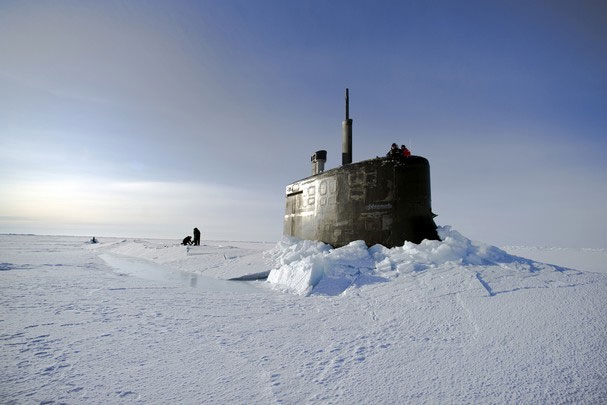Climate change warms up the
The race to strengthen influence in the Arctic between some powers is becoming more and more intense in the context of the world still not having a common voice in the fight against climate change.
AP said that for world leaders, the debate about climate change has long ended. Now they are preparing for a literally cold war in the Arctic, because scientists predict that due to rising temperatures, many precious resources and maritime routes that many countries dream of will show up. when the ice melts. Of course, many conflicts and disputes can also explode when the resource comes out.
Many military activities are taking place in the Arctic and analysts say such activities will increase sharply in the next few years. Last month Norway conducted one of the largest military exercises in Arctic history. The Exercise Cold Response - the name of the rehearsal - was organized with the participation of 16,300 soldiers from 14 countries. They practiced everything on cold ice, from terrorism to large-scale war.
The United States, Canada and Denmark also organized several exercises in the Arctic in January. And in an unprecedented move, commanded the armies of eight powers near the Arctic - including Canada, the US and Russia. , Iceland, Denmark, Sweden, Norway and Finland - met at a Canadian military base last week to discuss regional security issues.

USS Connecticut's submarine rose from under the ice in the Arctic Ocean. This is one of the submarines equipped with nuclear reactors to produce electricity so it can operate continuously under the sea for months.
All the events that happened do not mean that a war will take place in the Arctic in the near future. But amid the increasing number of workers and ships to the Arctic to explore oil and gas, some governments feel they must enact policies, strengthen border patrols and show military power. to deter resource competitors.
The US Geological Agency estimates 13% of oil and 30% of the undiscovered natural gas on Earth is in the Arctic. The US National Research Council predicts that ships can regularly move on trans-Arctic maritime routes by 2030 due to melting ice.
While the international community is still fiercely arguing about which countries will have to act to prevent global warming, some countries have implemented strategies to expand their influence in the far north. Earth. Russia, Canada and the United States have the greatest benefits in the north pole of the globe. Because the defense budget was torn into small parts by the war in Iraq, Afghanistan and a series of urgent issues in other parts of the world, the US proved to be the most delayed in the race to the North Pole, although Washington Owning submarine fleet using nuclear reactors to produce electricity. This submarine fleet can operate for months under the ice.
A third of Russian territory is located in the Arctic Ocean. Therefore, for decades, Moscow has shown the strongest attitude in the process of building up influence in the Arctic.
Rob Huebert, a professor of political science at the University of Calgary in Canada, said that Russia has fully recovered its strength after escaping from the economic crisis in the 1990s. Now the Kremlin is getting enough. the ability to enhance the military presence in the Arctic - a strategy that played a key role in the overall Soviet Union's path during the Cold War.
Patrol activities of Russian bombers and submarines have increased markedly over the past time. That situation makes other countries in the Arctic - Norway, Denmark and Canada - decide to restore regional drills. These three countries once reduced their size or abandoned exercises in the Arctic after the collapse of the Soviet Union. Even non-Arctic countries like France have shown interest in deploying troops here.
'An ocean that once separated from the rest of the world is becoming an area that people can access. A series of factors are emerging and strengthening each other. That fact made the military presence in the Arctic increase gradually and the level of presence will increase over time , 'Huebert commented.
- The trees that are most affected by climate change
- Climate change increases the risk of cancer
- Share information on climate change
- Earth warms very fast in the next 10 years
- This is how Dubai copes with climate change
- What is Climate Change?
- The cause of sea water warming up
- Forest fires will increase as the climate warms up
- The most affected people because the earth warms up
- The warming of the Earth increases the intensity of snowstorms
- Marching for climate change around the world
- Earth warms up causing extreme weather phenomena
 Is the magnetic North Pole shift dangerous to humanity?
Is the magnetic North Pole shift dangerous to humanity? Washington legalizes the recycling of human bodies into fertilizer
Washington legalizes the recycling of human bodies into fertilizer Lightning stone - the mysterious guest
Lightning stone - the mysterious guest Stunned by the mysterious sunset, strange appearance
Stunned by the mysterious sunset, strange appearance